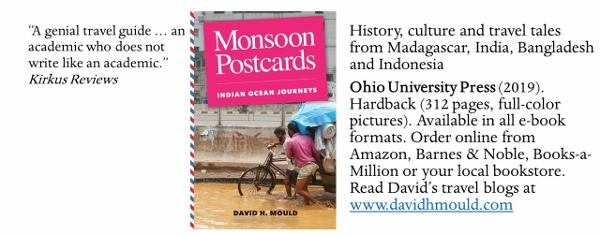“Don’t take the piss, luv. I’m bleedin’ knackered.” I caught the last part of the mobile phone conversation in the lobby of the Valley Garden Hotel in Sylhet, a bustling city in northeastern Bangladesh. By his dress and skin color, the speaker, a man in his 30s, looked Bangladeshi, but the accent and word choice were purely London. The man picked up his bag and went to the elevator. He looked as if he’d just arrived after a long flight.
Which he probably had. There are flights from Heathrow via Dhaka to Sylhet on Biman Bangladesh, the national airline, and other connections via Dubai and Delhi. They serve a community of Bangladeshis—or Sylhetis as they prefer to be called—who have settled in East London since the 19th century. The first came as merchant seamen, hired on in the southern port of Chittagong by British trading ships. When World War One broke out and young British men were conscripted to fight in the trenches, the demand for seamen increased and more Sylhetis took to the seas. Leaving their families was difficult, but they earned more money than they could working in the tea plantations. Between voyages, they lived in cramped quarters in London’s docklands. Some left the ships to take factory jobs and sent money home.
As Muslims, they maintained their culinary practices. In the 1920s, a Sylheti opened a curry shop that became the foundation for a thriving Bengali restaurant industry, centered on Brick Lane in Tower Hamlets. Bengalis of Sylheti origin comprise only 10 per cent of the South Asian population of Britain, but 90 per cent of all South Asian restaurants are Sylheti or Bangla-owned. Of course, the Brick Lane entrepreneurs adapted to British taste and climate, cutting down on the heat and spices. But they have been remarkably successful. Today, the Bangladeshi restaurant industry is estimated to be worth $6 billion a year.
Brick Lane, Tower Hamlets, London
Some of that money comes home to Sylhet in the form of remittances to support family members. It goes towards medical and educational expenses, and daily living needs. British Bangladeshis have built mansions outside the city to use when they visit. Most of the time, a colleague told me, they stand empty, with a guard, a maid and a gardener on staff. In a society where, despite its Muslim principles, material possessions are valued, the mansions represent a family’s social standing—a concrete (or usually brick) status symbol in a region where many people remain desperately poor.
According to economic statistics, Sylhet Division is the wealthiest region of Bangladesh outside Dhaka. But the wealth is unevenly distributed and the region lags behind others on indicators for health, nutrition and education. On the tea plantations, many workers are from the Indian states of Orissa and Bihar. They are the descendants of workers brought in by the British during the colonial era; they have struggled to preserve their Hindu religion and native languages and have never fully integrated into Sylheti society.
The tea plantations—or tea gardens, as they are somewhat romantically termed in Bangladesh—stretch across the low hills along the road from the airport to the city. Compared with the rest of the country, the region’s climate is cooler and wetter, making it (like its northern Indian neighbor, the state of Assam), ideal for growing tea, most of it for export.
Bordered on the north by the Indian state of Meghalaya and on the east by the state of Manipur, the Sylhet region is among the most ethnically diverse in the country, with villages of Manipuri, Khasis and Tripura people in the hills, practicing Hinduism, Buddhism and Christianity. The region has its own language, Sylhoti, with ties to both Bangla and Assamese. My travel guide claims Sylhoti has over 10 million speakers worldwide, some of them in East London.
The day my UNICEF colleague Yasmin Khan and I arrived, there was a hartal—a strike by transport workers protesting at an increase in the price of Compressed Natural Gas (CNG), which fuels all the auto rickshaws and many buses, trucks and cars. UNICEF’s security people had warned us to be careful because some roads had been blocked by strikers, but the main road was clear and mercifully free of traffic, so we reached the hotel in what our driver assured us was record time. Still, there was trouble elsewhere; the Sunday newspaper carried a picture of a government official’s SUV that was damaged by strikers. By early evening, the strike was over and Sylhet returned to its normal traffic congestion, its narrow streets clogged with auto rickshaws, bicycle rickshaws, vans and trucks. Sylhet is a major shopping destination, with some of the best discount clothing outlets in the country. Many British Bangladeshis (perhaps including the man in the hotel) come here on shopping trips; after paying for the flight and excess baggage, they’ll still come out ahead compared with shopping in the UK.



